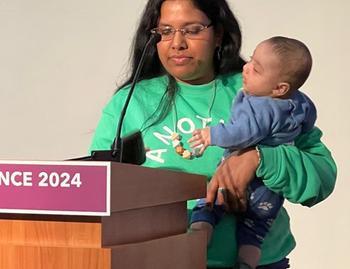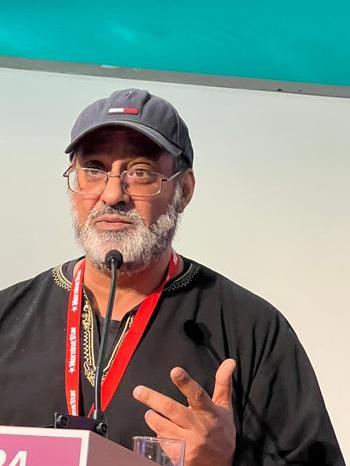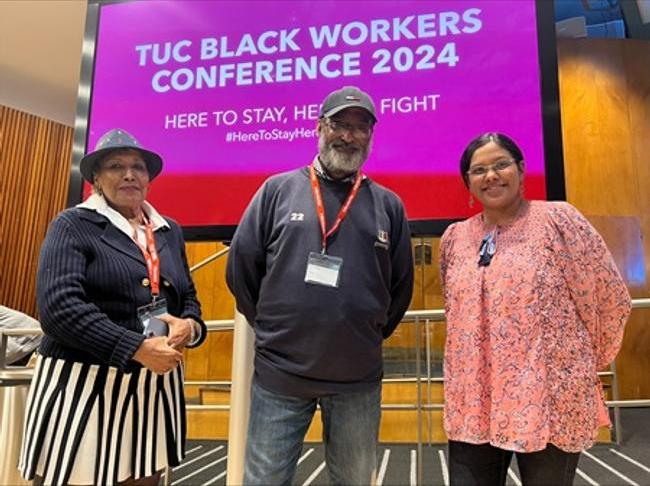TUC Black Workers’ Conference 2024
Babies, suicide and discrimination were all a feature of conference. Pic: conference delegates Sohair Soliman, Tony Adams & Saadeya Shamsuddin.
NUJ members shared highly personal experiences in speeches at this weekend’s TUC Black Workers Conference which brought delegates to their feet in standing ovations for passionate and emotive subjects.
Ethnicity Motherhood Pay Penalty

Taking to the rostrum with her five-month-old baby boy, Adam, Saadeya Shamsuddin from the NUJ’s Black Members Council (BMC) moved the union’s motion on the Ethnicity Motherhood Pay Penalty.
Coos softly rang out among the audience as Saadeya opened her speech with: “Last December I gave birth to a beautiful baby boy.” She explained how the referenced Fawcett Society research revealed how women of colour experience even greater pay disparities when they return to work after having children.
“All roads lead back to the same place: at the heart of the ethnicity motherhood pay penalty, ethnicity pay gap, and ethnicity pay reporting is systemic racism”, said Saadeya. “I’ve long maintained that a lack of people of colour in management roles is down to a cycle of discrimination and bias. It manifests itself in being overlooked for promotion, not receiving equal job and development opportunities as your white counterpart, and not receiving equal pay.”
She went onto speak of her own experience in the workplace as a journalist with a print background and masters degree in journalism. “It should not have taken me 15 years to be where I am, a manager in a leadership position at BBC and a mother of two - the first person of colour to be elected to a leadership role in my department in over a decade, after one hell of a fight.”
Saadeya spoke about the many black women postponing plans for children, saying, “it’s just until that promotion, that next contract that will lead to job security”.
She ended her speech with an impassioned call for peace in Gaza, saying “I cannot speak about motherhood and babies without acknowledging the thousands of babies and mothers suffering.” Conference was on its feet as Saadeya and baby Adam left the stage, and the motion was voted through unanimously.
“It’s ok to not be ok”

Later that day, NUJ delegate and chair of BMC, Tony Adams spoke in a debate on mental health inequalities, brought forward by train drivers’ union, Aslef.
A journalist and radio presenter by profession, Tony spoke from the heart to conference delegates, saying: “As a journalist, I’ve worn many different hats in my career. But I stand here today as a very vulnerable black man. I’m going to put my hand up and say. ‘I need help’.”
Tony disclosed to a supportive room of fellow trade unionists that he had twice in the past eight months intended to take his own life, taking journeys to a railway station with that intention. “I was a coward,” he said, “I didn’t take my life. It was my daughter’s face that I saw and drew me back home.”
Tony spoke of the psychiatric support he has received and his resistance to and rejection of hospitalisation under Section 21. He explained the unexpected support network he had found among Birmingham’s homeless community when he spent time on the streets, and again of the powerful love and support from his 16-year-old daughter.
His message to conference brought delegates to their feet, as he said: “Today, brothers, my black brothers especially – take some solace, it’s ok to not be ok. It’s ok to reach out because those are the people who love you.”
Sexual harassment
A variety of workshops were held on Saturday afternoon. NUJ delegate Sohair Soliman shared her experience of seeking advice from the NUJ on sexual harassment in the workplace and the valuable role unions can play.
The conference was lively and covered a wide range of policy issues. Recurring themes of discrimination in the workplace, endemic and systematised racism in working practices, and the enduring challenges facing black workers were brought to life with shocking examples from a range of industries, sectors and workplaces.
The controversial Minimum Service Levels (MSL) legislation – or ‘anti-strike law’ – was singled out for particular criticism, with speakers pointing out that transport (one of the most impacted sectors) has a higher density of black and minority ethnic staff at around 20 per cent of the workforce.
Kate Bell, TUC assistant general secretary, referenced the Labour Party’s pledge to repeal MSL legislation, and said the party’s New Deal for Working People “will be the biggest expansion of workers’ right for a generation”. She also spoke about Labour’s commitment to the Race Equality Act, including mandatory reporting.
On the opening day of TUC BWC, the TUC Race Relations Committee published and read out a statement on Palestine, calling for an immediate ceasefire and humanitarian support for Palestinians. This was echoed by guest speaker Hind Benammar, executive secretary of the Arab Trade Union Confederation. She said, “there is no military solution in Gaza” and called for solidarity and support with Palestinian workers.

Delegates Sohair Soliman, Tony Adams & Saadeya Shamsuddin.
